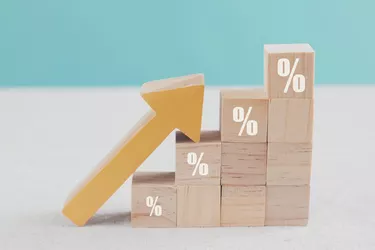
Demand for goods and services has increased as the U.S. economy has picked up steam after the pandemic. When this increase in demand is coupled with shortages in the labor market and problems with the supply chain, inflation goes up.
In December, the year-to-year inflation rate was nearly 7 percent, the highest rate it has been in the last 40 years. This rapid rise in consumer prices tends to affect low- and middle-income Americans the most.
Video of the Day
Video of the Day
What Will the Fed Do?
The Fed maintains a long-term target inflation rate of 2 percent. Unfortunately, inflation has been above that target rate for the past 10 months in a row. The high inflation rate is putting pressure on the central bank to take forceful steps to bring prices down.
To make matters worse, the stock market has reacted negatively to higher inflation. The S&P 500, the Dow Jones Industrial Average and NASDAQ are all down more than 10 percent, which is officially correction territory, according to investors and analysts.
Consider also: What is the Federal Reserve?
In addition to raising the Fed funds rate, the Fed has another way to increase interest rates to fight inflation: it can reduce its inventory of bonds.
Why the Fed Will Increase Interest Rates
The Fed uses hikes in the fed funds rate to slow down economic activity and, hopefully, reduce inflation. Raising interest rates increases the borrowing costs for consumers and businesses and slows down economic activity, which will reduce the demand for goods and services. The Fed uses the federal funds rate as the benchmark for other rates in the economy.
However, if rates are raised too quickly, this could slow down economic growth too much and possibly put the economy into a recession. But, the longer the Fed waits to take action, the more difficult it becomes to bring down inflation to the 2 percent target rate.
Fed Chair Jerome Powell has stated that the Fed intends to start raising the federal funds rate in March. Most analysts expect the Fed to raise the interest rate three or four times in increments of 0.25 percentage points. However, the high rate of inflation may drive the Fed to raise interest rates more quickly and raise rates by 50 basis points rather than the usual 25 basis points.
The question is not whether the Fed will raise rates, but more about how much, how many times and how quickly.
Consider also: What is the Fed Funds Rate?
How Much Will the Fed Raise Interest Rates?
Traditionally, the central bank has raised interest rates in quarter-percent increments. However, pressure is increasing for the Fed policymakers to increase the rate by 1/2 percentage points. The Fed has not raised rates this quickly since the year 2000.
Bloomberg News reported that James Bullard, the President of the St. Louis Federal Reserve Bank, believes that the central bank should take more aggressive actions and would like to see interest rates go up a full percentage point by July.
Consider also: How to Budget With Rising Inflation
The Fed Has Another Option
In addition to raising the Fed funds rate, the Fed has another way to increase interest rates to fight inflation: it can reduce its inventory of bonds. This is another tool in the Fed's monetary policy arsenal.
The Fed has about $8.8 trillion outstanding in bonds. In the past, they have been reinvesting the bonds as they matured, but they could change this approach and simply hold the bonds to redemption at maturity and shrink the inventory. This strategy would push bond yields up and tighten credit availability. Reducing their bond holdings would have the same effect as another rate hike in the fed funds rate.
Controlling the money supply by purchasing and selling bonds gives the Fed more room to cut back on the number of future rate hikes if inflation begins to go down.
- PBS:Federal Reserve Expected to Raise Interest Rates in Fight Against Inflation
- Reuters: Fed Likely to Hike Rates in March as Powell Vows Sustained Inflation Fight
- Forbes: Fed Readies March Interest-Rate Hike To Fight Inflation Surge Despite Stock Market Plunge
- NPR: Game time: The Fed Unveils a Tougher Plan to Fight Stubbornly High Inflation
- CNN: To Fight Inflation, the Fed May Resort to a Tool it Hasn't Used Since 2000